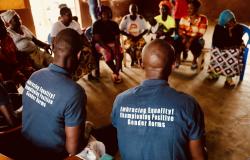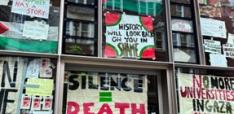To Eradicate Sexual Violence against Women, we Must Turn to Men

Six years ago, Sierra Leone’s President declared a national emergency over sexual violence. Today, men in the West African nation are playing their part to fight for the safety of women in their communities, Christina Mangunda writes.
In 2019, just a year and a half into my posting working as a Programme Manager with the British Red Cross in Freetown, the President of Sierra Leone, Julius Maada Bio, declared a national emergency after a surge in recorded cases of sexual violence. This was triggered by a major spike in rape and assault of women.
The declaration sounds shocking to an outsider. To those of us living here, it simply confirmed what we had already witnessed in Sierra Leone, a country still recovering from the deep wounds of the brutal civil war. Born and raised in Zimbabwe, I have held a variety of humanitarian roles and led many teams. Yet, I was shocked by the circumstances I was confronted with. But we rose to the challenge.
We set up a programme called Integrated Resilience Programme which we ran across twelve urban and rural Freetown communities. Designed to strengthen the resilience of local communities through workshops and trainings on positive gender norms, soon we also started to incorporate creative outlets like radio and drama.
A pivotal moment for the programme’s success was the establishment of the Agents of Change men’s group to tackle the alarming levels of sexual and gender-based violence. Agents of Change is a unique concept that evolved from the realities we faced. Working closely with the Sierra Leone Red Cross Society, we selected men from each community who occupied influential positions of power, from an Imam to a former gang member.
Initially, our work with women in local communities had resulted in some men within the community feeling excluded; they also wanted to be involved, to actively make their communities better and safer. Along the way, the programme adapted; we started to utilise picture cards depicting common scenarios where women’s rights were disrespected. The participants would then come up with solutions, and in doing so, recognised their own harmful behaviours, acknowledging how and where change was required.
These men and their personal stories became the foundation of the programme’s success. The anecdotes they would tell their peers, to encourage them that they too could change, would prove the most powerful vehicle in creating change. We began to witness profound change in perpetrators of violence, not just reformed in their own behaviour but now proactively fighting for the safety of women in their communities.
Take, for example, a former gang member and father of a six-year-old boy. This young man in his late twenties took on board what he learnt in the programme. He is no longer violent towards his partner and child, enabling his son to grow up in a supportive and safe environment.
Another man in his mid-thirties who, empowered by what he had learned, persuaded his elder brother to stop his violence towards his wife. In a context where gender-based violence had been normalised, these men have become beacons for significant changes in attitudes.
Off the back of our Agent of Change meetings, some communities have established their own community WhatsApp groups. With hundreds of members, Kissi Town Affairs and Rokel Decide WhatsApp groups in the rural communities of Kissi Town and Rokel have become a way of monitoring safety and enforcing accountability.
Sierra Leone is still an extremely challenging place to be a woman; it has one of the highest rates of female genital mutilation (FGM) in Africa and there’s a big gap between male and female literacy rates. But in recent years, the people of Sierra Leone have driven several positive changes.
Girls are now increasingly confident and enabled to report the practice of FGM and we are seeing a clear trend towards lower prevalences of FGM for younger women. Two years ago, Sierra Leone passed a new law to improve women's rights, which states that 30 percent of public and private jobs must be reserved for women.
Currently, a historic bill is being debated in the Parliament of Sierra Leone. A bill that could finally see abortion being decriminalised in the West African nation with the abolishment of centuries-old British colonial-era law – thanks to decades of relentless frontline campaigning by the women’s movement in Sierra Leone.
While the outcome is yet to be announced, there’s a tangible sense of optimism and hope. Backed by the President of Sierra Leone, the bill demonstrates the commitment to protect women and girls following the national emergency declaration over sexual violence.
Six years on, what it means to be a woman in Sierra Leone is changing – and it is men who are playing their part in creating lasting societal change. Change doesn’t come overnight but as a mother of three daughters, I take pride in our work. It has been a privilege to bear witness to it.
Christina Mangunda is a Programme Manager at the British Red Cross.
Photograph: Henry Jay Kamara/British Red Cross


